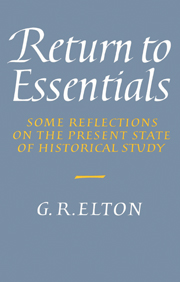THE HISTORY OF ENGLAND
Inaugural Lecture as Regius Professor of Modern History in the University of Cambridge, 1984
Published online by Cambridge University Press: 05 June 2012
Summary
MR DEPUTY VICE-CHANCELLOR, LADIES AND GENTLEMEN
In 1724, the elector of Hanover, engaged as king of England in founding a monarchic dynasty, endowed a chair of modern history at the University of Cambridge. (Also at Oxford, of course, but that is not this day a matter of major concern.) In 1808, one Samuel Meyer Ehrenberg, engaged (though he did not know it) in founding a modest scholarly dynasty, took over an ailing school at Wolfenböttel, a few miles from Hanover though then in the neighbouring duchy of Brunswick. In 1983, a descendant of the former bestowed her ancestor's foundation upon a descendant of the latter, thus keeping things within the old territorial relations. Indeed, the connexion was symbolized even more clearly. The elector of Hanover and the duke of Brunswick, both being Guelphs, were in a manner of speaking cousins; and in 1983 the holders of both those Regius chairs at Oxford and Cambridge are cousins too. There is a certain satisfactory rotundity about these essentially improbable events.
When I look back upon the history of the chair which now I have the great honour to occupy, I find myself even more impressed than usual by the mysterious ways of providence, or rather, perhaps, by the unpredictability of human purposes manifestly not controlled by providence. For about a century and a half the existence of Regius professors of modern history in this university could easily have escaped notice, though a few of them gave lectures.
- Type
- Chapter
- Information
- Return to EssentialsSome Reflections on the Present State of Historical Study, pp. 99 - 126Publisher: Cambridge University PressPrint publication year: 1991



